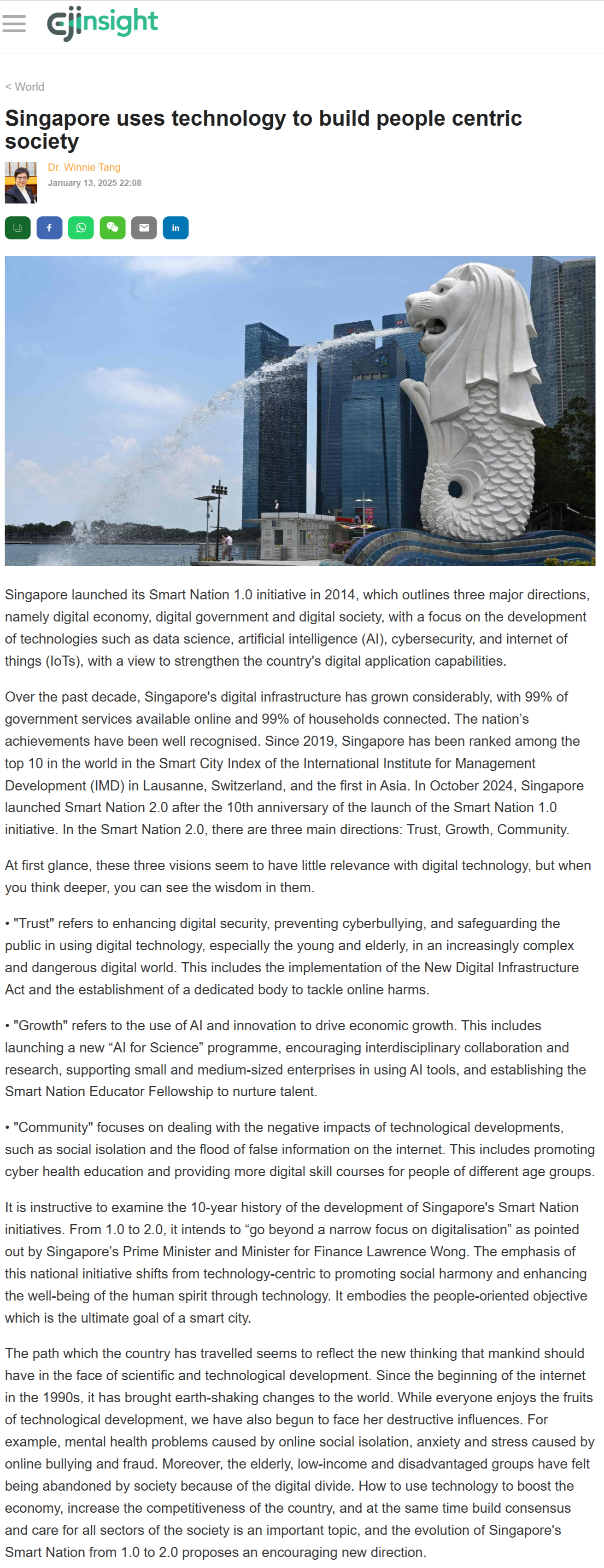網上版請按此

Singapore uses technology to build people centric society
Singapore launched its Smart Nation 1.0 initiative in 2014, which outlines three major directions, namely digital economy, digital government and digital society, with a focus on the development of technologies such as data science, artificial intelligence (AI), cybersecurity, and internet of things (IoTs), with a view to strengthen the country's digital application capabilities.
Over the past decade, Singapore's digital infrastructure has grown considerably, with 99% of government services available online and 99% of households connected. The nation’s achievements have been well recognised. Since 2019, Singapore has been ranked among the top 10 in the world in the Smart City Index of the International Institute for Management Development (IMD) in Lausanne, Switzerland, and the first in Asia. In October 2024, Singapore launched Smart Nation 2.0 after the 10th anniversary of the launch of the Smart Nation 1.0 initiative. In the Smart Nation 2.0, there are three main directions: Trust, Growth, Community.
At first glance, these three visions seem to have little relevance with digital technology, but when you think deeper, you can see the wisdom in them.
• "Trust" refers to enhancing digital security, preventing cyberbullying, and safeguarding the public in using digital technology, especially the young and elderly, in an increasingly complex and dangerous digital world. This includes the implementation of the New Digital Infrastructure Act and the establishment of a dedicated body to tackle online harms.
• "Growth" refers to the use of AI and innovation to drive economic growth. This includes launching a new “AI for Science” programme, encouraging interdisciplinary collaboration and research, supporting small and medium-sized enterprises in using AI tools, and establishing the Smart Nation Educator Fellowship to nurture talent.
• "Community" focuses on dealing with the negative impacts of technological developments, such as social isolation and the flood of false information on the internet. This includes promoting cyber health education and providing more digital skill courses for people of different age groups.
It is instructive to examine the 10-year history of the development of Singapore's Smart Nation initiatives. From 1.0 to 2.0, it intends to “go beyond a narrow focus on digitalisation” as pointed out by Singapore’s Prime Minister and Minister for Finance Lawrence Wong. The emphasis of this national initiative shifts from technology-centric to promoting social harmony and enhancing the well-being of the human spirit through technology. It embodies the people-oriented objective which is the ultimate goal of a smart city.
The path which the country has travelled seems to reflect the new thinking that mankind should have in the face of scientific and technological development. Since the beginning of the internet in the 1990s, it has brought earth-shaking changes to the world. While everyone enjoys the fruits of technological development, we have also begun to face her destructive influences. For example, mental health problems caused by online social isolation, anxiety and stress caused by online bullying and fraud. Moreover, the elderly, low-income and disadvantaged groups have felt being abandoned by society because of the digital divide. How to use technology to boost the economy, increase the competitiveness of the country, and at the same time build consensus and care for all sectors of the society is an important topic, and the evolution of Singapore's Smart Nation from 1.0 to 2.0 proposes an encouraging new direction.
Dr Winnie Tang
Adjunct Professor, School of Computing and Data Science; Department of Geography, Faculty of Social Sciences, The University of Hong Kong